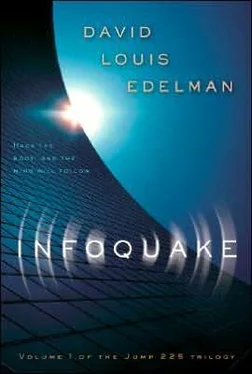"But-the connection strands-they're floating to your fingertips
The big man's eyes twinkled with a craftsman's pride. Suddenly, he clenched his hands into fists, and the snakes drooped limply back to the desk. "The rings," he said, twitching his fingers in the air. "They each broadcast a unique signature, just like a programming bar."
Jara had been watching Quell's display with characteristic skepticism. "So what is this thing?" she said, gesturing at the roller coaster structure of the program. "That was a nice demonstration, but how do we know it even works?"
"This thing is EnviroSelect 14," retorted the Islander. "And you know it works because it's been choosing the SeeNaRee for you every time you've stepped into a Surina conference room."
Jara pursed her lips, embarrassed. "Oh."
* * *
When they arrived back at the conference room, Benyamin was waiting for them. He didn't show the least bit of surprise at Quell's traditional Islander handshake, causing Horvil to wonder how his younger cousin could be so much more worldly than he. There was no sign of Merri yet, but that was to be expected; teleportation was challenging enough without the additional complications caused by 380,000 kilometers of space. She would not be here for a few more hours yet. Jara took one last look at her notes, muttered something unintelligible but definitely not pleasant, and then cut her multi connection.
Horvil and Ben dutifully followed Quell back through the hallways to the workroom where the engineering would begin. The Islander seemed inclined to walk several meters ahead of the two cousins, but Horvil managed to hustle to the big man's side.
"I was hoping you could explain something," said the engineer. "Obviously, you can make bio/logic programs with those funky rings there, but how do you test 'em?"
Quell eyed his counterpart with scarcely concealed suspicion. "What do you mean?"
"I thought Islanders didn't run bio/logic programs because bio/logics is unholy, or something like that."
"You're thinking of the Pharisees. That's not us at all. We run bio/logic programs in the Islands every once in a while; people there install some of the basic OCHREs. Our Technology Board just discriminates a lot more carefully than your connectible governments."
"We discriminate pretty carefully," said Horvil in a wounded tone of voice.
Quell shook his head, and for a second the engineer thought he was going to burst out laughing. "How much code do you have floating around your system right now, Horvil?" he said.
Horvil thought carefully, trying to account for all the programs he activated willy-nilly every minute, the background code created by his L-PRACG and the Prime Committee, the constant hum of molecular activity instigated by his OCHREs. Processes whose names he didn't know, routines that had been installed by hive technicians before birth and running constantly since then. "I don't know," he said. "Thousands, probably."
"And do you know who wrote them all? How do you know they're all going to work together flawlessly?"
"That's why we have governments. That's why there's Primo's and the Council."
"Governments. Primo's. The Defense and Wellness Council." The Islander spat out the words as if they were the names of particularly odious criminals. "Do you trust them?"
"Not entirely. But I'm not gonna sit around all day and weed through bio/logic programs either."
Benyamin, who had been listening a few paces behind, now came trotting up on Quell's right side. "But we have a system for opting out of these standard bio/logic programs," he said. "The Islander Tolerance Act of 146. High Executive Toradicus signed it."
"Spoken like a true governmentalist," said Quell, though his tone of voice was not unkind. "Create an opt-out provision, and put the onus on our taxpayers, on our governments. The Technology Board has a huge team that does nothing but register these `Dogmatic Oppositions' twenty-four hours a day to keep your bots and data agents out of the South Pacific. And who do you think pays their salaries? Do you think your Prime Committee has ever sent a bloody credit our way to fund their Tolerance Act?"
Horvil blushed furiously. He had heard of Dogmatic Oppositions, of course, but to him the term had just been verbal dressing tossed around in Khann Frejohr's speeches. He had never met anyone to whom these things actually mattered. "Politics," muttered Horvil. "I hate politics."
At that, the Islander let out a titan-sized laugh of such gusto that all the security guards in the hallway instantly felt for their dartrifles. "If you hate politics," said Quell, "you're in the wrong fiefcorp."
"So how many programs do you have running in your system?" snapped Horvil.
The Islander looked at Horvil with an expression that hinted at fondness or amusement. "Twelve. And seven of them are for my asthma."
* * *
Horvil had started to drift into an interior monologue about the evils of politics when he was jarred back to reality by their arrival at Quell's workroom. The Islander made an obscure hand signal to a unit of blueand-green Surina security officers, and a dozen of them instantly marched up to the workroom door and formed a protective ring around it. This was no loose formation like the one Horvil saw here half an hour ago; these troops had their fingers on the triggers of their guns and were clearly ready to use them. "Thank you," said Horvil inanely as he stepped into the room with Ben and Quell and closed the door behind him.
Two dozen guards at the gates to the Surina complex, thought Horvil. And then more guards blocking the way into the Surina Enterprise Facility ... and now even more right outside the door ... You'd need an army to get past all those dartguns.
Then he remembered that Len Borda did have an army. Several armies, in fact. He shivered.
Quell was obviously used to the pressure. He marched into the center of the workbench and waved his hand around the table. Ben and Horvil jumped back in awe as a dozen interlocking modules of pink and blue appeared in the MindSpace bubble. Horvil now understood the need for the large workspace; the program took up every square centimeter and extended halfway to the ceiling like a Gothic castle. Connection strands stretched from module to module in startling and intricate patterns, some circumnavigating the whole mass several times. Even an observer who knew nothing about bio/logic coding could lose himself for hours studying the beautiful detail, the interplay of colors, the endless number of aesthetic themes that replicated across the surface of the program. Horvil had seen entire nervous system simulators that were less complex.
"So this is MultiReal," he gulped. Next to the Byzantine topography of the MultiReal program, Probabilities 4.9 would look like a pastel-colored pimple.
"That-that's amazing," stuttered Ben.
Quell's face showed a mixture of pride and sadness, the palimpsest of some epic experience that Horvil could hardly begin to imagine. "After sixteen years of work," he said, "it ought to be."
"Sixteen years?" said Horvil, his jaw hanging low. He couldn't imagine working on the same program for sixteen months.
"And that's just Margaret's part of it. Half of this code was passed down by her father when he died-and she contracted out a lot of bits and pieces." Horvil nodded as if Quell's statement were self-evident. "Now are we ready to start coding?"
The two cousins nodded in sync, and they got to work.
Probabilities 4.9 did indeed look quite puny beside the gargantuan MultiReal engine. Its double helix shape was a child's trick in comparison, a second-rate sleight of hand. Horvil found the sight of the two programs side-by-side a big metaphor for the entire situation Natch had gotten them into. The Surina/Natch MultiReal Fiefcorp? thought the engineer, wishing he could just erase the Probabilities ROD and pretend it had never existed. This is the Margaret Surina MultiReal Fiefcorp, plain and simple. We don't belong here. We're completely out of our league.
Читать дальше






![David Jagusson - Fesselspiele mit Meister David [Hardcore BDSM]](/books/486693/david-jagusson-fesselspiele-mit-meister-david-har-thumb.webp)





